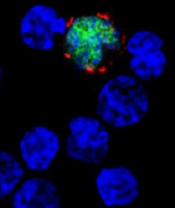
among uninfected cells (blue)
Image courtesy of
Benjamin Chaigne-Delalande
The European Commission (EC) has granted orphan drug designation for CMD-003 (baltaleucel-T) as a treatment for nasal type extranodal NK/T-cell lymphoma and post-transplant lymphoproliferative disorder.
CMD-003 consists of patient-derived T cells that have been activated to kill malignant cells expressing antigens associated with Epstein-Barr virus (EBV).
The T cells specifically target 4 EBV epitopes—LMP1, LMP2, EBNA, and BARF1.
CMD-003 is being developed by Cell Medica and the Baylor College of Medicine, with funding provided, in part, by the Cancer Prevention and Research Institute of Texas.
About orphan designation
Orphan designation from the EC provides regulatory and financial incentives for companies to develop and market therapies that treat a life-threatening or chronically debilitating condition affecting no more than 5 in 10,000 people in the European Union, and where no satisfactory treatment is available.
Orphan designation provides a 10-year period of marketing exclusivity in the European Union if the drug receives regulatory approval. The designation also provides incentives for companies seeking protocol assistance from the European Medicines Agency during the product development phase and direct access to the centralized authorization procedure.
CMD-003 also has orphan designation from the US Food and Drug Administration to treat all EBV-associated non-Hodgkin lymphomas.
CMD-003-related research
CMD-003 is currently under investigation in a phase 2 trial, CITADEL, for the treatment of advanced NK/T-cell lymphoma.
Researchers have not published results from any trials of CMD-003, but they have published results with EBV-specific T-cell products related to CMD-003.
In one study, published in the Journal of Clinical Oncology, researchers administered cytotoxic T lymphocytes (CTLs) in 50 patients with EBV-associated Hodgkin or non-Hodgkin lymphoma.
Twenty-nine of the patients were in remission when they received CTL infusions, but they were at a high risk of relapse. The remaining 21 patients had relapsed or refractory disease at the time of CTL infusion.
Twenty-seven of the patients who received CTLs as an adjuvant treatment remained in remission at 3.1 years after treatment.
Their 2-year event-free survival rate was 82%. None of the patients died of lymphoma, but 9 died from complications associated with the chemotherapy and radiation they had received.
Of the 21 patients with relapsed or refractory disease, 13 responded to CTL infusions, and 11 patients achieved a complete response. In this group, the 2-year event-free survival rate was about 50%.
The researchers said there were no toxicities that were definitively related to CTL infusion.
One patient had central nervous system deterioration 2 weeks after infusion. This was attributed to disease progression but could possibly have been treatment-related.
Another patient developed respiratory complications about 4 weeks after a second CTL infusion that may have been treatment-related. However, the researchers attributed it to an intercurrent infection, and the patient made a complete recovery.


